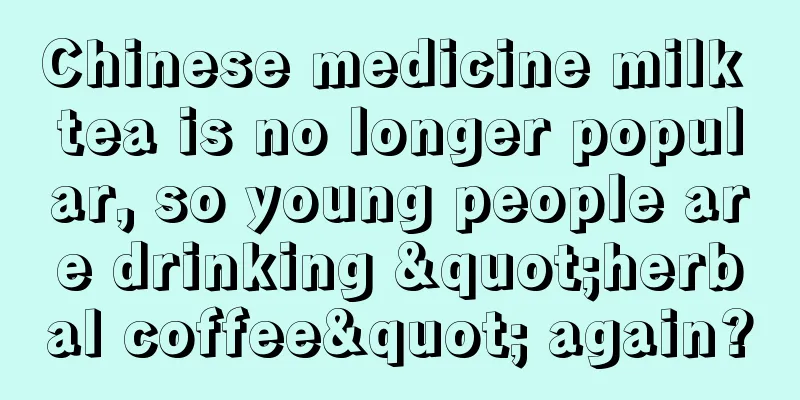Chinese medicine milk tea is no longer popular, so young people are drinking "herbal coffee" again?

As the competition in the new tea beverage market intensifies and all the new tricks are exhausted, the once briefly popular "health-preserving" method is once again putting old wine in new bottles. Chinese medicine milk tea is nothing new. Adding bird's nest, peach gum, rose, black wolfberry, and various health-preserving names to milk tea has been a business for Tongrentang, North China Pharmaceutical, Tonghanchuntang and other old-fashioned pharmaceutical companies in the past few years. Now, this gameplay has been "borrowed" by the coffee industry. The items on the menu range from Rhodiola latte, wolfberry latte, to monk fruit Americano, or honeysuckle cold brew. The decoration style mostly imitates that of traditional Chinese medicine clinics or shops. The order list is designed as a "prescription". There is even a Chinese medicine cafe where one needs to first diagnose and feel the pulse before choosing a drink based on one's physical condition. This trend of "Chinese medicine coffee" is quietly emerging in places like Chengdu, Harbin, Shanghai and Guangzhou. There are many local Chinese medicine clinics collaborating with coffee brands, or trying out cross-border business, and there are also many coffee brands setting up their own businesses. However, can the young people who used to soak wolfberries in their left hand and hold coffee in their right hand, focusing on a "punk health regimen", rekindle their passion for Chinese herbal coffee? 1. Combining Chinese and Western medicine, "prescribe a prescription" before drinking coffeeUnder the white walls and green tiles, a Chinese-style door plaque named "Yongle Hall" is particularly eye-catching. When you mistakenly think that this is a Chinese medicine shop, you push the door and find that on the bar counter full of Chinese medicine lists and Chinese medicinal materials, there is a coffee machine. The scale weighs the coffee beans, the Chinese medicine cup is used to hold the coffee, and the cups of Guilinggao Latte and Luo Han Guo Americano have become the "signature". This is a "Chinese Medicine Shop" coffee shop located in Shenzhen, Guangdong, which just opened in July this year. Olivia, who works nearby, noticed this new shop on her way to the subway and decided to give it a try. "It doesn't look like a coffee shop at all, but there is a small sign hanging at the door saying coffee." Olivia tried Chinese herbal coffee for the first time because she wanted to experience the "novelty" . "I usually like to drink coffee, so I also try coffees of various flavors. I have tried a lot of tea, coffee, and fruit coffee, but it is really hard to imagine what Chinese herbal medicine tastes like with coffee." When the Guilingjiang Latte and Luo Han Guo Americano were served in front of her with Chinese tableware, Olivia took a sip. "Because Guilingjiang is a typical Cantonese flavor, it doesn't seem out of place when paired with coffee." While major coffee chain brands continue to expand into the tea coffee and fruit coffee categories, pairing coffee with various teas such as jasmine and Biluochun, and fruits such as pistachios, oranges and peaches, many cities have begun to incorporate Chinese medicinal herbs into coffee, opening up a new path for new Chinese coffee drinks. Chinese medicine coffee shops in various places on Xiaohongshu In Zhejiang, Fang Huichuntang, a time-honored traditional Chinese medicine clinic in Hangzhou, recently launched a "paste prescription health series coffee drinks" in cooperation with coffee brand Bajiaobei Coffee. There are two special blends in total, namely longan and snow pear paste latte and oatmeal and barley latte. The coffee cups are affixed with a new Chinese label "Spiritual Coffee Prescription", with the main purpose of "beauty and heart". In Jiangsu, the TCM clinic brand Bailitang promotes the concept of "medicine and food have the same origin", incorporates ancient prescriptions into tea drinks, and launches new types of TCM coffee and tea drinks. The brand is named "I've opened a prescription", and the "prescription" is labeled on the cup, "take coffee internally, one cup at a time, once a day, and take one more time when necessary". Its important coffee categories include Luo Han Guo Americano, wolfberry latte, tangerine peel latte, etc., with a price of about 25 yuan; The Shande Chinese Medical Clinic in Xi'an has also launched a variety of Chinese medicine "national essence" coffees with the coffee brand "CUP LAB", including the Chan Gong Zhe Gui which adds coix seed powder and osmanthus and claims to have "acne-removing and desensitizing functions", the Zhima Shengdi which adds black sesame to "grow hair and nourish hair", and the Taoyan Yue Se which adds peach gum to "moisturize and nourish the skin". … In addition, similar Chinese medicine coffee shops have appeared or are emerging in Nanning, Huizhou, Foshan and Chongqing. There is no shortage of young people "checking in" at these Chinese medicine coffee shops, with copywriting such as "real life-saving coffee" or "the difference between coffee and Chinese medicine, the former cannot be swiped by medical insurance." Zinc Scale found that the decoration styles of this type of Chinese medicine coffee shops are similar, all based on traditional Chinese style, often equipped with Chinese medicine shop names and plaques, or directly located in Chinese medicine clinics. There are various Chinese medicine shop decorations and ornaments, and there are obvious Chinese medicine elements on the tableware and cups. Many stores even order in the form of "prescriptions". As for drinks, they are mainly based on more common medicinal materials such as wolfberry, red dates, tuckahoe, monk fruit and black sesame. 2. Are all the tricks used to make milk tea still “flavorful”?The "traditional Chinese medicine + beverage" gameplay is not new. As early as two years ago, traditional Chinese medicine milk tea had set off a craze. Tongrentang, Tonghanchuntang, Zhang Zhongjing Pharmacy, North China Pharmaceutical and other time-honored Chinese medicine brands entered the new tea drink track around 2021. In addition, some cities have also seen local pharmacies launch traditional Chinese medicine milk tea shops, which are often hidden in traditional Chinese medicine clinics and pharmacies. Chunfeng, which received two rounds of financing in March 2021 and January 2022, is one of the best. Its main product lines include pure herbal teas, milk teas and fresh fruit teas that combine the concept of health preservation, such as "standard" health teas such as staying up late, oil-removing water, and Xiaodiaoli soup, as well as "functional" teas such as Poria cocos, lily, and coix seed water, collagen three treasures fresh milk tea, and chrysanthemum lemon passion fruit. According to previous public reports by the media, the number of its stores nationwide exceeds 150. However, compared with new brands, time-honored Chinese medicine brands always seem to have more innate advantages in the "Chinese medicine +" model. As early as 2020, the century-old Tong Hanchuntang launched Chinese medicine milk tea. Among them, Hanchun Popular Nourishing Selection, Tong Hanchuntang Ginseng Winner, Guochao Fairy Fruit Tea, Classic Health Tea and other drinks are all herbal teas, combining Chinese medicine and milk tea, and there are also traditional health drinks such as Xiaodiao Pear Soup and Collagen Rose Dew. In 2022, the Medicinal Diet Shop of Liuzhou Traditional Chinese Medicine Hospital also launched three kinds of Chinese herbal milk tea, namely Yinhe milk tea, Baohe milk tea and Shuixing milk tea, with a medium cup costing 13 yuan and a large cup costing 19 yuan. According to its menu, Shuixing milk tea has the effect of strengthening the spleen and stomach, nourishing the kidney and replenishing qi, and Chinese medicines include astragalus, rehmannia, atractylodes, and wolfberry; Baohe milk tea has the effect of strengthening the spleen and stomach, removing dampness and reducing turbidity, and Chinese medicines include tuckahoe, coix seed, cardamom, and perilla. However, the trend of Chinese medicine milk tea seems to have passed quickly. Zinc Scale noticed that although Chunfeng mentioned above frequently appeared on social media platforms in 2022, it now seems to have been submerged in a large number of new tea drinks, and there are few new "check-in" sharing. Tong Hanchuntang has many negative reviews on major review websites, such as "It's really too unpalatable. I heard it's a Chinese medicine store. They should just sell medicine properly in the future", "It's more hype than form... the drinks they serve are not amazing", "It's not very good for an old brand to become an Internet celebrity... I thought I could drink a cup of strong tea, but it turned out to be just a cup of water", etc. Negative reviews of Chinese herbal coffee on Dianping.com In fact, the same tricks that have been used in the milk tea industry are now being used in the coffee industry, and may not be able to escape the trap of "more hype than substance." In fact, some coffee brands had tried this before this year, before the emergence of this type of "medicinal coffee". For example, as early as 2022, a coffee shop called "Conscience Chinese Medicine" appeared in Guangzhou, which used Chinese medicine pots to make special coffee, incorporated Chinese medicinal materials such as monk fruit and tangerine peel, and had many check-in notes around July 2022. However, Zinc Scale noticed that the coffee shop has been suspended. Zhima Health, launched by Tong Ren Tang, has herbal coffees such as wolfberry latte, monk fruit Americano, and black wolfberry honeycomb brewed coffee as its main products. Although it has opened more than ten stores in many places, its reputation is also polarized. Among them, on review websites and social media platforms, there are comments like "The coffee tastes really weird. If this kind of coffee with its own IP is not popular, it will be unpalatable", "The taste is really hard to describe. If you want to try health coffee, you don't have to. The beans are very bad", "It's not good to drink, it tastes like Chinese medicine"... "In fact, the Chinese medicinal materials used in the Chinese medicinal coffee on the market are relatively common and easy to blend, such as tangerine peel, red dates and wolfberries. If the flavor of the Chinese medicinal materials is not prominent, it is easy for people to think that Chinese medicinal coffee is just a gimmick, but if the flavor of the Chinese medicinal materials is too prominent, many consumers will not be able to accept it." Minmin, a barista at a coffee shop in Chengdu, told Zinc Scale, "Many young people who try Chinese medicinal coffee are more curious than for real health preservation." Professor Fang Yong, a famous young and middle-aged Chinese medicine doctor in Wuhan and director of the Chinese Medicine Rehabilitation Department of Hanyang Hospital of Hubei Provincial People's Hospital, also said in an interview with Jimu News that this combination is mostly to cater to the tastes of young people and is also a marketing method. However, from the perspective of Chinese medicine, the use of these nourishing herbs and ingredients varies from person to person. Moreover, when combined with milk tea, coffee, etc., it is inevitable that excessive sugar in the milk tea will be consumed, so there is little point in talking about health preservation on this basis. 3. Is the health care business for young people profitable?If you want to do the health business for young people, in addition to freshly brewed tea, from Wanglaoji's herbal tea to "a whole root of ginseng water", this kind of health tea has actually left a deep impression on young people. The former is well-known for "drinking Wanglaoji if you are afraid of getting angry", and the latter even "sold more than 50,000 bottles a day". However, if you continue to observe, you will find that young people tend to "get high quickly and get low even faster" for this kind of health tea. However, the health needs of young people are still a vast ocean. The latest data from the "China Better Life Survey" found that in 2023, the top three consumption items for young people aged 18 to 35 are travel (32.77%), computers, mobile phones and other digital products (31.67%) and health care (31.04%). Image source: China's Better Life Survey The "Z Generation Nutrition Consumption Trend Report" released by Xinhuanet earlier also showed that young people are becoming the main force of health consumption, and young consumers aged 18 to 35 account for 83.7% of the health consumption population. It is worth mentioning that the "Z Generation" is more personalized in its health consumption choices, showing four major trends: keeping up with the trend, lazy health, involutionary nutrition, and self-pleasing consumption. However, due to the lack of professional nutrition knowledge and perseverance, it is often easy to start and give up health preservation. In the survey, more than half of the "Z generation" said that a scientific and nutritious dietary lifestyle can be easily maintained after a few days, and 62.44% of the "Z generation" said that there is a possibility of waste after purchasing nutritional products. This means that there is a future for the health-preserving business among young people, but after the trend-following "pseudo-health-preserving" of the "Z generation" has set off a wave, it seems difficult to continue to build momentum for it. Therefore, Zinc Scale has noticed that, whether it is Chinese herbal milk tea or Chinese herbal coffee, the brands that have emerged are trying to expand their profit margins through "open franchising". However, if they only rely on "gimmicks" and blindly open franchising to expand stores, the brand may still make a lot of money, but the franchisee may only be left with nothing after the limelight fades. Author: Li Xuanqi; Editor: Gao Zhi Source public account: Zinc Scale (ID: znkedu), focusing on original in-depth reports on technology and the new Internet economy. |
>>: To get the best deal on Meituan, buying a membership is the worst option
Recommend
Is Pang Donglai the standard answer to China’s retail industry?
In the landscape of China's retail industry, P...
Can you make money by doing cross-border e-commerce at home? Is it easy to do?
To do cross-border e-commerce, you need to first u...
How did “Zibo BBQ” become popular?
In the past month, "Zibo BBQ" has become...
What are the reasons for Shopee to associate stores? What are the consequences of being associated?
Shopee cross-border e-commerce has been a popular ...
Three levels of B-side operations (Part 1): Contents and drawbacks of primary B-side operations
In the field of B-side operations, different realm...
The core competitiveness of the workplace is language
You will find that successful people spend more ti...
The "Chinese old money trend" popularized by Xiaohongshu was also wiped out by Taobao and Pinyin
Recently, the new Chinese style of dressing has be...
What is Amazon TSFC association? How long does it take for the video certification results to be released?
Amazon is a cross-border e-commerce platform. Many...
Is there any promotion on Amazon during Double Eleven? How to use the discount code?
Double Eleven is indeed a good time to buy oversea...
Amazon will update the logistics process of creating shipments
Amazon Global Selling announced that the "Sen...
How should you charge for your SaaS product so that both you and your customers can succeed?
There are many charging models for SaaS products, ...
How to check if Amazon search terms are natural positions? How to check the natural ranking of keywords?
For Amazon merchants, after opening a store, they ...
What does an Amazon shipping label mean? Which labels should be applied?
There are bound to be many things you don’t unders...
The data of Xiaohongshu account has always been very poor. What is the reason? What are the solutions?
Those who have operated Xiaohongshu know that some...
How many items should Lazada put on the shelves every day? How does Lazada operate?
As we all know, there are more and more merchants ...









